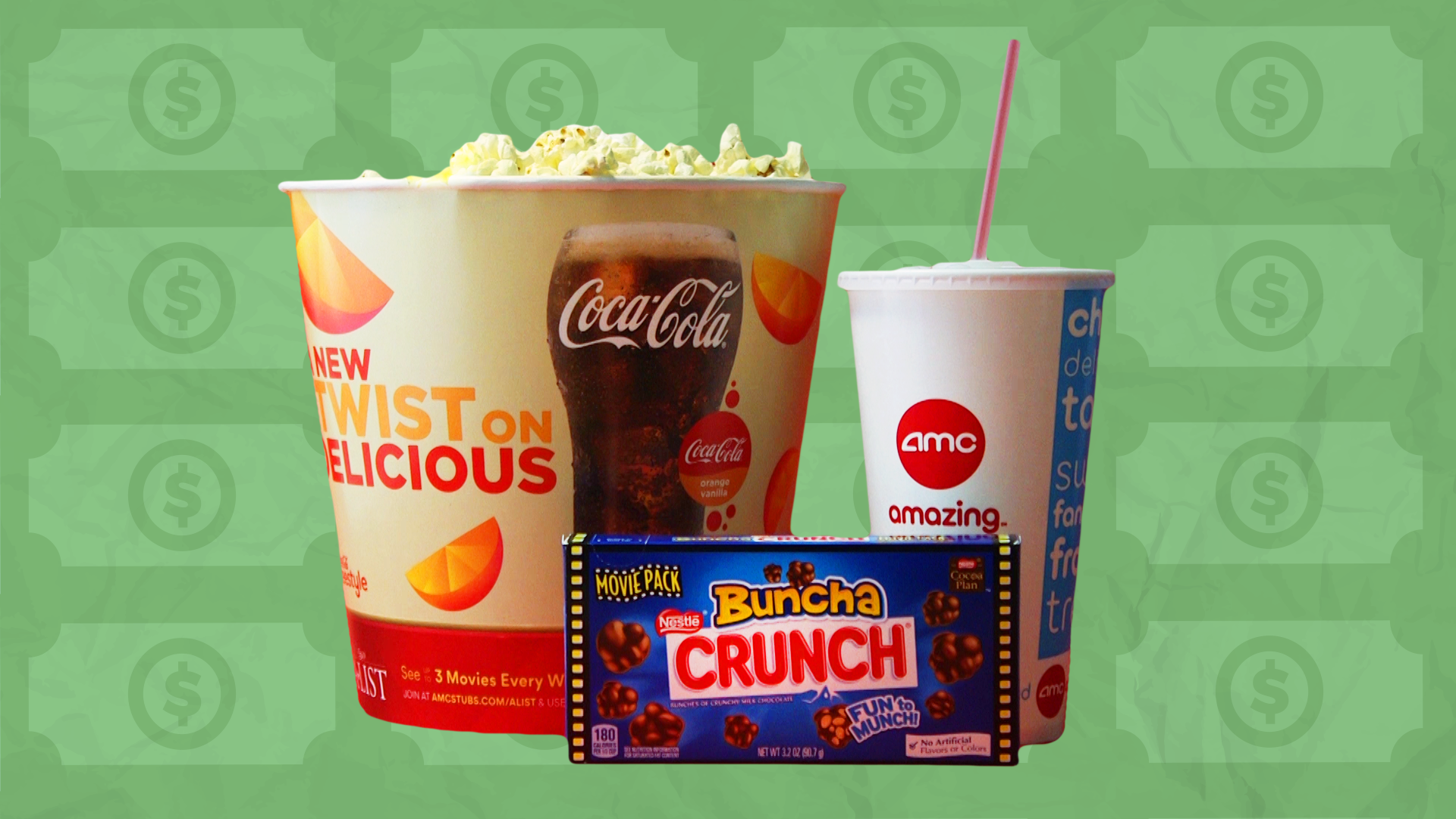- Movie theater chains like AMC and Regal only keep around 50% of the revenue from ticket sales each year.
- But theaters keep over 80% of concessions revenue, so most theaters are designed to get you to spend money on food.
- And it works. AMC reports that more than 71% of attendees spend money on concessions.
- Visit Business Insider’s homepage for more stories.
Following is a transcript of the video.
Narrator: So, I just saw the new “Spider-Man.” The ticket cost $12, my popcorn was $8, the candy was $4.50, and my soda was $6. That’s over $30 for just one person. Movie theaters are like theme parks or carnivals. Once inside, you play by their rules. And if you’re like me, you spend way more than you expect to. AMC isn’t really selling you a movie ticket. They’re selling you this food.
You can’t get in here without spending money. It all starts with the ticket. You might have heard that movie-ticket prices keep climbing, averaging over $9 nationwide, and almost twice that in big cities. Going to see a movie means you have to spend at least the cost of admission. But if you think that money is going to the theater, you’re wrong. Chains like Regal and AMC keep only about 50% of the money they take from ticket sales each year. The bulk of that ticket price goes back to the distributor. And if you want to see a higher-quality format, you have to pay a huge premium. But it doesn’t really matter how much your ticket costs, because if you’re going to a movie theater, chances are you’re buying some food. AMC reports that more than 71% of attendees purchase something at concessions.
Kim Moon: If they did not have concessions, they wouldn’t be in business.
Narrator: That's Kim Moon. She's a marketing instructor at the University of Illinois at Chicago. And she's right. Without concession sales, both AMC and Regal would not make a profit.
Moon: So, when you walk into a theater, you will see tons and tons of imagery, as it relates to food and beverage.
Narrator: Most movie theaters are designed so you have to walk past the concession counter. The actual movies are tucked away, down long, dark hallways. But as soon as you get inside the theater, the food is bright, colorful, and, thanks to the glass cases, visible at every angle. You can see popcorn popping, stacks of candy, and giant soda machines.
Kit Yarrow: The big, huge boxes serve sort of like a billboard effect. They're enormous and so calling out to you more than an appropriately sized box. When you open it up, though, it's about the same amount of candy in there as a small box that you might find at the drugstore.
Narrator: All of this is surrounded by TV screens that loop beautiful shots of soda and popcorn. Food is constantly grabbing your attention. Unlike a restaurant, where the food is prepared out of view, a movie theater makes everything right in front of you.
Yarrow: Visually taking over the space, they also are physically taking over the space. It's really hard to get around it. You kind of have to stop, figure out where you're going, and, in the process, you're being exposed to all of that stimulation. We're queuing people, psychologically, to want something.
Narrator: And then there is the smell. Aah, that heavenly smell. Ingrained in every moviegoer's brain is the smell of buttery popcorn. This smell gets your attention as soon as you walk in and evokes a sense of nostalgia. You probably don't eat a tub of popcorn and a box of Buncha Crunch at home, but here, you do. And in bigger theaters, there might even be multiple concession areas. If your auditorium is on a higher floor, get ready to pass by two or three tempting displays. And because no outside food or drink is allowed, if you want to eat something during your two-hour movie, you have to get it at the theater.
OK, so you want to buy just one thing, something small and cheap. Well, good luck. All of the items at concessions are more expensive than what you would pay outside the theater. And, often, you can't even find a small size. So you have to choose between regular and large. What does regular even mean? The large seems like a better deal. It's only a dollar more. So you may be tempted to spend a little extra. And if you're going to eat all of that salty popcorn, you're probably going to get thirsty. So you'll buy a drink, too.
And that's great news for the theater. Because all of the food sold at concessions has a huge profit margin. That means they're cheap to make but are sold at a high price. Remember that $8 popcorn? Theaters make a lot more on that bag of popcorn than they make on your ticket.
Let me show you what I mean. In 2018, 62% of AMC's total revenue came from admissions. Thirty-one percent was from concessions. But AMC was able to keep almost 84% of that concession revenue as profit, compared to just under 50% that they were able to keep from admissions. Basically, if you spend $1 on food, AMC keeps $0.84. But if you spend $1 on a ticket, it keeps only $0.50. So it will do whatever it can to get you to spend more money on food.
Moon: Buy one, get one free; free upgrades; free refills; what they're doing is using price discrimination.
Narrator: That means they'll offer you a greater value with a larger size. The margins aren't as good, but the theater is still getting more of your money. And movie theaters love to offer combos. Popcorn with soda, a hot dog with fries, candy and a slushy, pretty much any combination you can think of. Unfortunately, those combos usually aren't a great deal. Unless you're sharing in a big group, you'll probably be stuck with more food than you can eat and free refills that you won't use.
Yarrow: They end up wasting a lot of that popcorn, but, most importantly, they end up wasting that money.
Narrator: Many theaters have also started offering things like alcoholic beverages and full meals. These might bring a better experience, but they also allow theaters to charge an even higher premium. Like this AMC deal that offers a hot dog, curly fries, and a chocolate-chip cookie for $13. Combine all of this with bright-red colors, warm lighting on the food, and brand tie-ins, and it's tough to walk away from the counter with just one thing. But the tricks don't stop at the lobby.
Theaters list movie start times that are 15 to 20 minutes earlier than when the movie actually starts. This helps the theater in two ways. It allows them to show more commercials before the trailers, which is another source of revenue, and it keeps moviegoers sitting and waiting for longer. If you have to sit through 20 minutes of ads and trailers, you might give in and go grab a box of candy, especially if those commercials are for food and soda. And delayed start times also remove the pressure of missing the beginning of the movie. So you might not mind waiting in line for some snacks.
Each interaction is designed to get you to spend money on concessions. Just look at the ticket window compared to the concession counter. At this AMC, the ticket window is plain and not very stimulating. But the concession counter is bright, colorful, and branded. It immediately catches your eye.
But those are the tricks they use only when you're actually at the theater. Theaters are also experts at getting you back to see another movie. Reward points and special-access programs get consumers to go to the movies more often. Gaining points for each dollar you spend is a great motivator to buy a little more than you normally would.
Moon: They report their members going to movies more often with the subscription than without. And, of course, these members will bring their friends and their families, who will pay full price.
Narrator: And if you saved money on your ticket with a program like AMC A-List, you might be more willing to spend money on food. Some of these programs can actually save you money, but you shouldn't spend more just to get points or discounts faster. Of course, if your loyalty program is on an app, the theater has 24/7 access to your attention and can send push notifications with details about promos and deals, like this AMC ad that offers free popcorn when you purchase a ticket for your friend. Even when you're not at the theater, they're still trying to get you to spend money.
You might be pretty annoyed at movie theaters right now, but it's not an easy business. Avid moviegoers want modern, well-maintained theaters with high-quality formats, and because so much of the ticket price is going to the distributor, theaters have to find alternative sources of revenue, which means snacks and drinks.
So, should you just stay home, throw some Orville Redenbacher in the microwave, and watch only what's on Netflix? Of course not! Going to the movies is supposed to be fun. But you have to make sure the movie you're seeing and the food you're eating is what you actually want, not just something that has been constantly advertised to you. And these tactics are employed best at big chains, like Regal or AMC. At a local theater, you'll often find cheaper concessions and tickets. So, what can you do to save money?
Moon: Eat before you go.

